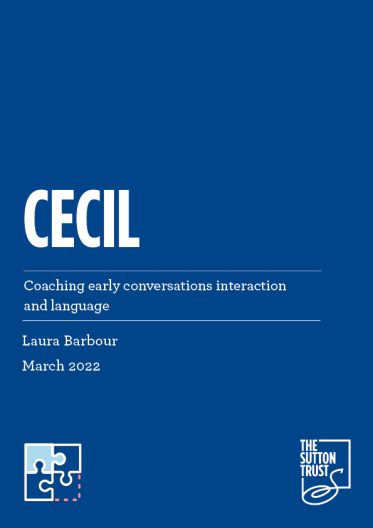Findings from interviews as part of the Implementation and Process Evaluation
Perceived change in practitioner behaviour and the nursery environment
- Practitioners reported that they have increased skills, confidence, and motivation to support children’s language and communication development.
- Practitioners reported that they have increased knowledge and awareness of individual children’s language, which allows them to identify gaps and tailor strategies.
- Practitioners reported using strategies which enable interactions to be child led e.g., slowing down, balancing comments and questions, and OWLing (Observe, Wait and Listen to let the child lead the interaction).
Perceived impacts on children’s language and communication skills
- The context of the COVID-19 pandemic was felt to have negatively impacted language and communications skills for some children, but other children were at the expected level or had higher levels of language.
- Both programmes appeared to be universal interventions which practitioners felt supported the language of all children at their settings, with particular benefits in targeting approaches for children who were struggling or had additional support needs, e.g., EAL or shyer children.
- Practitioners observed that improved language and communication skills also had benefits for personal, social, and emotional development, with increased turn-taking and verbal negotiation between children instead of just taking toys or objects from each other which could lead to conflict and fights.
Findings from the Impact Evaluation
There was significant attrition from those in the research sample, which resulted in a small sample size available for evaluation. As a result, results must be interpreted with caution, and more sophisticated approaches to analysis that would have been appropriate in a larger sample were simply not possible.
Child language
- In Nottinghamshire, children in the Early Starter (intervention) group scored about 11 points higher on average than those in the Late Starter (control) group in Summer 2021 after controlling for scores at baseline. This difference was borderline statistically significant, suggesting that there may be an effect of the intervention despite challenges caused by the pandemic both to the intervention itself and the evaluation.
- In Hackney, no significant difference was found between the Early and Late Starter groups in terms of children’s language development by Summer 2021. This does not mean that the intervention had no effect, only that the evaluation was not able to detect an effect, which may be a result of the very small analytical sample size. It is also worth noting that anticipated effect of the Hackney model relies more on the regular (weekly) presence of a SaLT in the setting, which was significantly reduced by COVID restrictions.
Practitioners’ confidence and skills
- No significant differences were found between the Early and Late Starter groups in terms of change in confidence and skills based on practitioner self-report between Autumn 2020 and Summer 2021. This does not mean that the interventions in Nottinghamshire and Hackney had no effect; the evaluation was not able to detect one given the very small sample of practitioners (15 in Nottinghamshire and 14 in Hackney) for whom data could be matched across the two time points.
